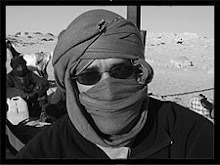I spent the remainder of my time in-county hiking solo around the rainforest that surrounded Luna Lodge. The howler monkeys would wake me around 5:00AM, whereupon I would lay reading in a hammock until breakfast, then lace up my boots and trudge off into the wild. I encountered many fascinating sights. At one point I stood dumbfounded and watched a group of leaves, wobbling and waving, walk vertically down the side of a tree. This seemed impossible, but then again, I have seen the Magical Goat Trees of Morocco, so all bets were off. I rubbed my eyes until I saw twice as many leaves doing the Fantasia Dance down the side of the tree, but they weren't imaginary. I have seen many leaves in my time, but never one with the safety-conscious motivation to carefully see itself down to the forest floor. On closer inspection the mystery was solved. Columns of barbarous leaf-cutter ants were victoriously hauling their plunder back to their nest.
Ants have always fascinated me. As a child I would lovingly torch the little buggers to death with a lighter and a can of hairspray. After dropping the pyromania in my early teens, I began to appreciate their more subtle qualities. The organizational skills they instinctively possess are admirable, and their colony structure reveals an impressive social hierarchy. More advanced species are often found performing incredible feats, such as building bridges and ladders from their own bodies, or eliciting real emotion from the audience during a midsummer production of Mac Beth. I was lucky enough to encounter several battalions of army ants during my visit. Army ants are vicious. In addition to raiding other ant colonies for slaves, they are carnivorous. Up to four hundred thousand at a time raid en masse, an inky river of death that devours everything in its path. I managed to avoid the carnage by pulling my socks up over the cuff of my pants, though I still got bit a few times. In retrospect maybe I shouldn't have tried swimming in that particular river.
On my final night at Luna Lodge, I was enjoying dinner with a few of the other guests when one of the women let out a little shriek and jumped back from the table. Our attention was quickly diverted to a most unexpected guest. At the far end of the table slithered a young boa constrictor. Since boas are not particularly dangerous snakes to begin with, and this one was rather small, we left him there while we finished our meal. He eventually constricted, then ate, a delicious baked potato before slithering off into the night. Fare thee well Costa Rica, I shall return.















